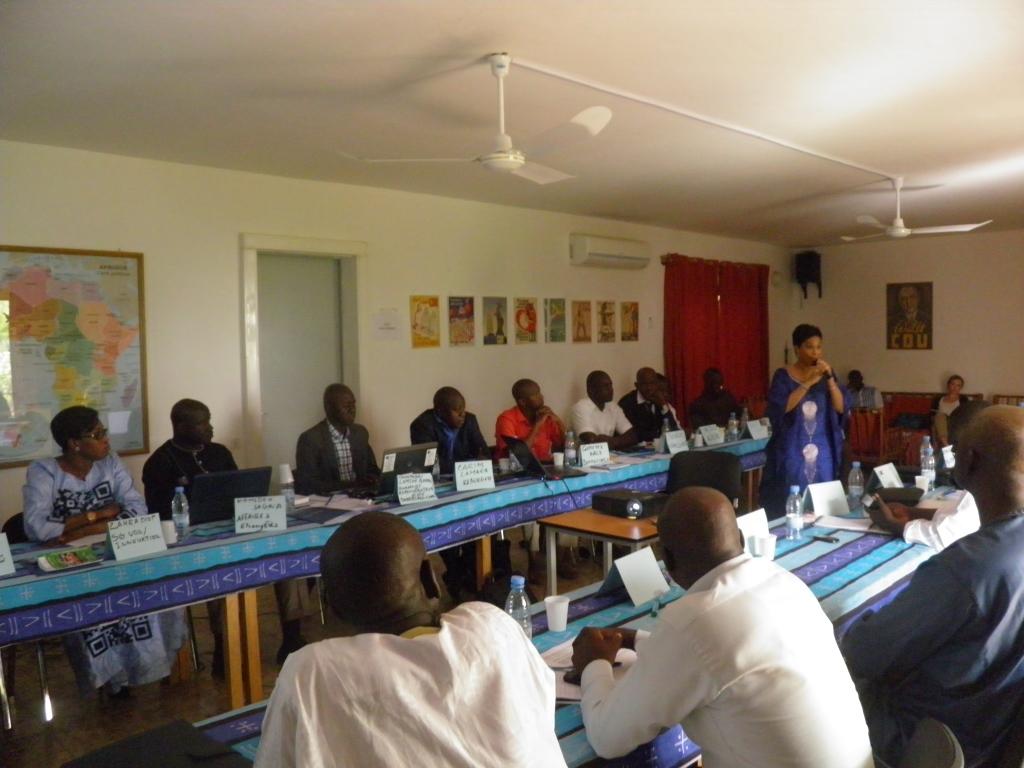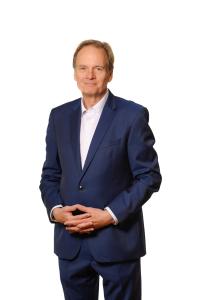Event reports
Within the context of the political landscape in Senegal the workshop tried to find answers to a range of questions: What is the best way to present oneself to the electorate? What does the “homme politique” expect and how is he best addressed? And last but not least: How do you turn a “chef traditionel” into a “leader moderne”?
Nathalie Yamb, who has had much work experience in the communication sector in Africa, knows of the complex situation. She therefore advises: “One has to use all means of communication that are at ones disposal”. The new media therefore should not replace the old forms of communication but rather only compliment them. When it comes to communication it is similar as with political ideas themselves – one always has to adapt to new conditions and developments. While all necessary means of communication are being utilized, they are not utilized to a sufficient extent.
Especially a clear differentiation of the different political parties, their beliefs and goals, is needed so that the electorate can make informed decisions. This is why with regards to communication the motto should be: Differ from others and set yourself apart! Aboubacar Sadikh Ndiaye also raised the question why one would never use the term Marketing when speaking of political communication. Just like commercial advertisements, parties sell products too – namely their political beliefs and candidates.
At the beginning of the workshop Ngiaye therefore explained the new possibilities that come with Web 2.0 and the expansion of Social Media like Facebook, Twitter and co. While the freedom of the press is formally granted in Senegal, Social Media can create a direct connection between party and electorate. Consequently they can decrease the party’s dependency on selective reportage by public and private media. While the old Web 1.0 is a one-way street and only allows for unidirectional communication, the interactive and social “second generation” of the web facilitates direct feedback and input from the constituency. It therefore promotes cooperation with those, who are directly concerned by the politics. Furthermore, Facebook statistics like page views are useful indicators and allow for fast evaluations of the question: Do we reach the population?
Another useful tool for small parties are Web TV and Web Radio. These means of communication cost very little, as one only needs a camera or microphone as well as internet. New media can furthermore contribute to party funding, for instance through Crowdfunding or online-banking via the cellphone.
Nevertheless, these new forms of communication also require a new logic and innovative strategies for their optimal use. Nathalie Yamb is worried by the fact that political communication in many African countries decreases to a very large extent after an election is over or even stops completely. Many politicians may be active at Twitter during the electoral campaigning but afterwards one does not here anything from them anymore. However, communication has to take place between elections as well.
Furthermore it is important that the chosen form of communication is not exclusive. Although the official language of the Senegal is French, Wolof is the only language which is spoken by the entire population. Moreover one also has to consider the possibility of Analphabetism in order not to exclude any potential voters.
During the afternoon of the first workshop day, the main question analyzed was: How does it go in your particular party? The participants gave an insight into the present state of their political communication and spoke about the challenges they are facing. While, a majority of the Senegalese parties already use Facebook and co., not all of the parties actually possess their own websites. The utilization of Social Media becomes even more important in this case.
Another Problem in Senegal is that while the majority of the electorate is very young, this is not reflected in the electoral campaign. However, if one wants to reach the youth, one has to speak their language. It is therefore necessary to develop an understanding of communication that also appeals to the youth. The electoral behavior of the older generation is often determined by geographical factors like tribal belonging or the continuation of support for established political personalities. However, this is different with regards to the youth. In order to represent the problems and worries of the youth in a credible way, special attention has to be put on creating a dynamic image of the party amongst the public. The public impression of the candidate is not necessarily related to age but to charisma. Nonverbal communication is also important. Often the electoral campaign in Senegal is dominated by photos of the party leader. Instead of crossing his arms, he should display an open body language –everybody knows a picture says more than a thousand words. Nathalie Yamb furthermore showed the participants a CDU-poster of the last parliamentary election. It consisted of photos of all election campaign volunteers and thereby demonstrated the CDU’s emphasis on inclusion.
Independently of size and political orientation of the party, all participants share the problem of strong hierarchies in the internal organization of their parties. The party leaders often bear the responsibility for all areas of communication, despite the fact that they are usually not experts in this domain. Due to a lack of capacities there is often only one website administrator or tasks are not being clearly allocated.
It is therefore important to find ways to bring innovation into the old communication strategies of the parties. On the second day the workshop therefore got to its practical part. Through group work the participants developed approaches for new and innovative strategies for a hypothetical party X – for the election campaign as well as beyond. The objective was to let the participants go back to their parties and implement them. The leading questions for this exercise were for instance: Which impression do we want the electorate to have of us? And how do we create it?
The different groups proved to be creative. In addition to social projects, that would strengthen the public’s trust in the governance capabilities of the party, they discussed how an 80-year old party leader could be displayed in a way that he also appeals to the youth.
In the end it is especially important that there is not only one responsible person for the party’s communication but that the whole party leadership is being included. In order to make use of the full potential of the new media, the politicians themselves should develop an understanding and also utilize them to get into contact with the electorate.
Although at the end of the workshop the participants still had differing political views, with regards to communication they all agreed: The far-reaching presence of the party and the candidate is the basic element of any election campaign. However, in addition to posters, the press and broadcasting services, the new media also create the option of visibility in the web. Thereby it does not matter whether one belongs to the ruling party or the opposition – in the digital world everybody is still in a learning process.
Jenny Ohme was an intern at KAS Media Africa from October to November 2014









